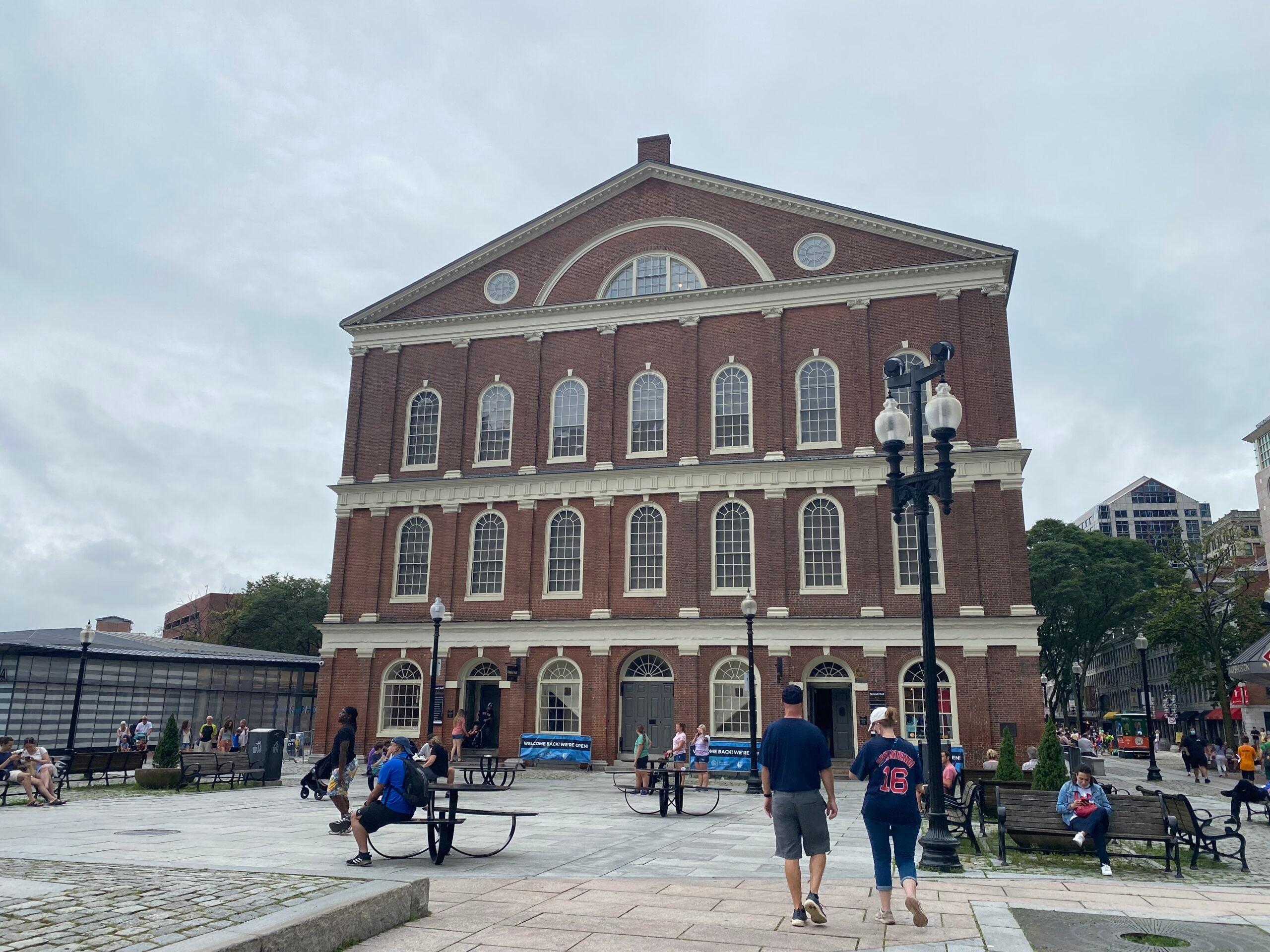Where Boston’s mayoral candidates stand on the renaming of Faneuil Hall
[ad_1]
Local
The issue remains controversial as few of the five main candidates – all of them colored – are ready to answer where they stand on this question.
For years, protesters have been calling on the city to rename Faneuil Hall, a historic market square and assembly hall that traditionally attracts around 20 million visitors a year because its namesake benefited from the property and trade of Africans. Marcus E. Howard for Boston.com
More than a year after renewed calls to rename one of Boston’s most famous landmarks, the issue has proven to be a political hot potato for candidates in the upcoming mayoral election.
For years, protesters have been calling for the city to rename Faneuil Hall, a historic market square and assembly hall that traditionally attracts around 20 million visitors a year because its namesake benefited from the property and trade of Africans.
Former Mayor Marty Walsh opposed the idea before stepping down last spring, despite a nationwide settlement on racist monuments and symbols.
Although the name was changed at least four years ago, renewed interest followed the death of George Floyd, a black man killed by Minneapolis police last summer.
Local activist Kevin Peterson, founder of the New Democracy Coalition, a grassroots citizens’ initiative, is planning another protest to bring the matter back to attention.
“I may go hungry again at Faneuil Hall next week,” he said in an email on Tuesday.
The Change.org website has collected more than 2,600 signatures in support of the renaming of Faneuil Hall.
The issue remains controversial in Boston, however, as few of the top five candidates in the running for mayor – all colored – are ready to answer where they stand on the issue.
This includes incumbent Mayor Kim Janey, who did not respond to requests for comment on whether or not she supports the renaming of Faneuil Hall. Janey, the city’s first black man to become mayor after Walsh stepped down to join President Joe Biden’s cabinet, attempted to rename Boston diverse and “all-inclusive” in a $ 2.5 million marketing campaign to boost post-COVID tourism.
But renaming a building that was owned by Peter Faneuil, a wealthy merchant and slave trader from the 18th century.
On Friday, thousands of summer visitors traversed the building, originally completed in 1742, reading t-shirts, postcards, and other souvenirs celebrating Boston’s revolutionary history.
Aside from a poster in a larger exhibit in the boardroom on the second floor, they found little about the bond with slavery that the structure made possible. Faneuil Hall is owned by the city and operated by the National Park Service.
The other two black mayoral candidates, councilor Andrea Campbell and former economic development chief John Barros, also failed to respond to requests for comment on Faneuil Hall.
Asian-American councilor Michelle Wu previously called for more to be done to highlight the city’s diverse history. For example, in 2017 she moderated a panel discussion on monuments and justice. When asked about the namesake of the landmark, however, she held no support for a name change.
“We still have a long way to go to take our city’s past into account and to reduce systemic racism in all its forms,” ​​Wu said in a statement. “In addition to a detailed discussion about Boston’s monuments, memorials and place names, we need concrete measures to eliminate the racial differences that have persisted for far too long.”
During her three terms in office, Councilor Annissa Essaibi George has called for better representation of women and women of color in naming art, places and landmarks in public spaces. Nonetheless, Essaibi George, who identifies as Arab-American, has also not committed in one way or another to renaming Faneuil Hall, although she said she was open to a discussion about it.
“I acknowledge that the fight to rename Faneuil Hall is not just about changing the name – it is about recognizing the systemic racism and injustices that exist across our city,” she said in a statement .
Boston has struggled to shake its identity as a racist city, whether deserved or undeserved. New census data released this week showed the city continues to lose its black population, which has declined 3.3 percentage points over the past decade.
In a few other major cities, the push to rename landmarks tied to white supremacy has been welcomed by elected officials. Eric Adams, the likely next New York City Mayor, has openly spoken out in favor of replacing controversial monuments.
Opponents of the renaming argue that, despite its less desirable origins, the Faneuil Hall brand has become a living monument of freedom for younger generations. After all, it is home to countless speakers, from abolitionists to human rights activists who have fought for more equality.
Still others see a connection between national identity and public spaces that have long commemorated and prioritized the stories of a select group of people, some of whom have backgrounds considered problematic in today’s world.
In a 2002 scholarly article in The New England Quarterly, Western New England University historian Jonathan Beagle wrote that Peter Faneuil’s involvement in slavery even in Boston in the early 19th century.
He quoted the abolitionist Wendell Phillips who, in an 1852 address to the Massachusetts Anti-Slavery Society in the assembly hall, said: “Peter Faneuil’s ancestors were themselves refugees from a decree almost as cruel as the fugitive slave law… A Huguenot built this hall. who was not allowed to live on the soil of this own beautiful France, and it can of course be assumed that he dedicated it to the ultra-extreme idea of ​​freedom. “
A preliminary mayoral campaign to narrow the field from seven candidates to two city candidates is scheduled for Tuesday, September 14th for the first time.
Subscribe to Newsletter
Stay up to date with the latest news from Boston.com
[ad_2]

